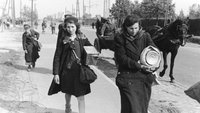Monika Hauser: “The men did not ask their wives, ‘So what happened to you during the war?’ because they did not want their wives to ask them, ‘And what did you do over there?’”
The May issue of GEO deals with the “Russenkinder”. Why does Germany only talk about the cases of sexualised wartime violence committed by the Red Army?
Monika Hauser: Because until now the research conducted on sexualised violence committed by Allied forces during the Second World War was very one-sided. In West Germany, the focus was restricted to rapes committed by Soviet soldiers, which served to perpetuate a particular prejudice. During the Cold War, the raped women were used politically and the racist image of the ‘evil Russian’ fitted well. In the GDR, of course, the situation was different.
So was sexualised wartime violence talked about in the GDR with ‘evil Americans’ in the role of the ‘bad guys’?
Monika Hauser: The issue of rapes committed by Allied forces was actually a non-issue in the whole of Germany until very recently. It was also taboo in the GDR because otherwise they would have had to address the crimes committed by the ‘good comrades’, too.
So after 1945, in the Soviet occupation zone and later in the GDR, women were not allowed to talk about it. There was no dialogue on this issue until the appearance of the film “BeFreier und Befreite (Liberators Take Liberties)” from Helke Sander at the beginning of the nineties – which was actually the first film on this issue.
In her book “When The Soldiers Came”, historian Miriam Gebhardt reveals the rapes committed by Western Allies on women. Does that surprise you?
Monika Hauser: Here I can answer quite generally and say: In the end, I am never surprised to hear about sexualised violence. But of course I am surprised at the magnitude which she describes as a result of her research. Once again this shows how hidden this topic has remained due to decades of deliberate silence and looking in the other direction. On the one hand this is due to the issue of sexualised violence itself and on the other there is a political dimension. The issue was simply undesirable and the women were left completely alone.
With UN Resolution 1820, rape has been acknowledged and condemned as a “tactic of war”. However, US soldiers at the time also raped women in Great Britain and France – their allied countries, so how can that be explained?
Monika Hauser: We cannot consider these rapes to be a tactic of war or act of revenge. They are sexualised violence and we have to take a look at the structures of power and violence in the countries where the soldiers came from. Everywhere, whether in France or the USA, we have patriarchal societies where rape is a tried and tested tool to preserve power during times of war.
And this is why I am not very surprised that the Allies also raped. The key issue is always ‘the patriarchal context’. Men use sexualised violence against women and girls – and against boys – to preserve their own power, to control and to humiliate. Nonetheless, specific war contexts give specific answers and we always have to take a precise look.
What reasoning can be found for the fact that after the liberation of the Ravensbrück concentration camp, Soviet soldiers raped Jewish women who had been starved so severely they were walking skeletons? That makes us speechless! We have to admit that war is not ‘healthy’ for men, either. They are traumatised by the violence they commit against others and also by the violence they have to see or suffer themselves. And what animalistic, abnormal things they then do! I do not intend to excuse them but I do want to show: War is not good for anyone.
The numbers vary enormously. Gebhardt comes to a figure of 860,000 raped women in Germany and other sources state 2 million. What do you think about these calculations?
Monika Hauser: It’s simple: We can see that no one really knows the true figures! Nothing has been documented; authorities were either non-functional or not looking at this issue.
There is no war context in the world where we know the real figures. And I have been asking for 20 years: How do we count? If one woman was raped 30 times, do we enter this into the statistics as 30 rapes or one? And none of the statistics can account for women who were murdered after suffering enormous violence. Do we include them or not?
Miriam Gebhardt conducts a new type of extrapolation which is indeed very relevant for West Germany. However, it is questionable whether it is permissible simply to take the numbers for the GDR and multiply them by two. This can neither be proved nor disproved. Nobody knows if she is right. But I think the fact she has discovered these sources in Bavaria is very interesting, as are the figures she comes to for western Germany.
If the affected women were still alive, we could ask them, couldn't we?
Monika Hauser: We still need to speak about the issue of silence. Even if they were still living today, they would not talk. That is not an argument. But the most we can say is that the women were not asked because this issue was not present after the war. For the women in this patriarchal German post-war society, it was simply existentially impossible to talk about these things.
Remain silent, conceal issues and don’t get asked. The men did not ask their wives, ‘So what happened to you during the war?’ because they did not want their wives to ask them, ‘And what did you do over there?’. Since they knew, after all, that their husbands and brothers had also carried out the things which they had experienced here. So there was an unwritten rule of silence – a societal rule which applied to both genders. Additionally post-war society also did not allow people to talk about their own experiences of violence, in light of the overwhelming extent of violent crime committed by the Nazi regime.
While we’re talking about the perpetrators: Was there any form of criminal prosecution of the perpetrators? Did the women have any opportunity to pursue them judicially?
Monika Hauser: The answer: No. These men were not prosecuted by the German state. As the prestige of the Red Army began to suffer when people heard about the mass rapes, General Zhukov handed out punishments, including death penalties. This brought a swift end to the rapes. Which shows how quickly human rights violations can be ended if there is clear guidance from leaders.
On the American side, according to Ms Gebhardt, there were also judgements passed. I have no reason to doubt that, but it can only be a small number of cases. Another interesting aspect is that many of the cases apparently involved black US Americans being punished for raping white women. So racism is also playing a role here.
The ‘occupier’s children’ were worse off than illegitimate children from German relationships. It was not until 1956 that the women were able to receive financial assistance. What effect did that have on their lives?
Monika Hauser: They suffered from severe economic hardship, were socially extremely isolated and had to bear the consequences of a serious trauma. They were unable to talk about their experiences with anyone and received no specialist support whatsoever.
Economic hardship left them isolated and they were alone in their social exclusion, too. People immediately knew which children these were – especially if they were dark-skinned. Or people knew: ‘That woman has a child but is not married!’ I would assume that in a situation like this the women would hardly have dared to actually file an application for the financial support they could have received. Economic hardship, social exclusion and trauma. These mothers handed down a lot to their children, who then suffer from transgenerational traumatisation. We can see that in Bosnia, we see it in Rwanda: the women are left very alone with their children and these have very few social opportunities. Our long-term partner organisation in Rwanda, SEVOTA, provides assistance to these women for that very reason.
You just used the term ‘transgenerational trauma’. What does that mean?
Monika Hauser: This refers to the effect when people who have not been able to process their own trauma and carry it with them for the rest of their life then pass on this trauma to their children and the next generations. If we do not recognise this interconnection, then the following generations look elsewhere for the source of their problems.
The mothers often have ‘frozen souls’. The husband comes back from the front and the woman has been surviving as best she could. But neither of them talks about what they experienced. They start a family. After all, having children is at least one way to gain a reasonable degree of social acceptance. But psychologically the women have shut down completely.
When children are brought up by a mother with a ‘frozen soul’ and a father who is often also traumatised by his experiences during the war, we can imagine the atmosphere prevailing at home, influencing the way these children grow up. And the disturbances which develop because of this then lead to the consequences we are all too familiar with: suicide, severe post-traumatic stress symptoms, abuse of medicines or alcohol, inability to bond, and more.
Fathers who were completely distant and mothers who were psychologically frozen: that led to the society we still live in today. Worst of all is the total lack of an opportunity to name or process their own sadness, their own pain. Miriam Gebhardt says something which we at medica mondiale also noticed long ago: the really astonishingly tragic aspect of war is its aftermath – silence, silence, silence.
In a special topic publication from medica mondiale “Time to Talk”, you state the French sent their North African mercenaries ahead with instructions to rape. Did the Germans have any idea what they were in for?
Monika Hauser: Now, the racist propaganda in Germany – and Miriam Gebhardt also writes about this – always said: ‘When the Russians come they will dishonour and abuse our women... .’ And of course, that is exactly what happened.
But what had German soldiers done in the East? Or in France? Maybe the Germans believed only the Russians would rape and the Americans, British and French would be more civilised. But they experienced how mistaken they were.
Female children were hidden and we can see there was indeed a good reason for this. In the region Freudenstadt, for example: When I was in Achern to give a lecture last year – a town directly on the German-French border – several elderly people spoke about that. They told me how it had never been talked about but they definitely knew it had happened.
This knowledge is still present among the older parts of the population. How can we carry it consciously into the next generations? So it was definitely time for the publication of a book such as “When The Soldiers Came”. And it is long overdue that now, 70 years after the war ended, there are some articles and TV programmes about sexualised wartime violence. We at medica mondiale do not often have the chance to publicise these unpleasant issues because they are rarely dealt with publicly in Germany. So we are grateful for every opportunity which helps us to break through the silence.




